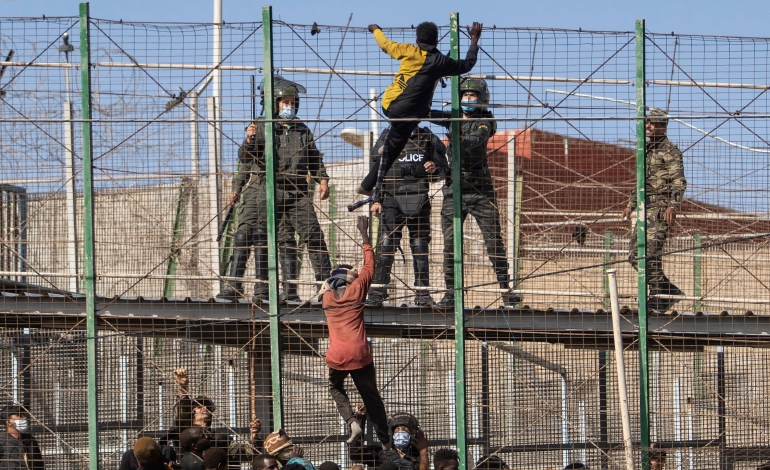African Migrants’ Murder At Moroccan Border Sparks Outrage
Europe’s violent border policing has raised calls for African governments to stop migration flows by improving conditions for their citizens.

The killing of African migrants who attempted to cross over to Spain at a Moroccan border has sparked outrage in Africa over dehumanisation.
A Spanish NGO said at least 37 migrants died in the unprecedented violence, but Moroccan authorities maintained only 23 migrants died.
The victims, who were shot at close range by Moroccan police on Friday, June 24, were among the 2,000 migrants that stormed a barrier between the Moroccan region of Nador and the Spanish enclave of Melilla, holding sticks to scale the heavily fortified fence.
The massive attempt also resulted in a stampede that injured many, including police officers.
Viral footage showed bodies with bloodstains littered around the border. In another footage, a police officer beat a visibly numbed body with a baton as other police officers scurried through a pile of bodies to arrest survivors.
The footage has spurred anger and debate in Africa and Spain over migration policies and violent border policing.
Many migrants from sub-Saharan African regions such as Nigeria had spent months crossing the Sahara Desert and camped in the Gourougou forest in Morocco, braving precarious conditions to reach Europe at all costs.

Morocco, the only African country sharing a border with Europe, has been a channel for sub-Saharan African migrants fleeing war and seeking better lives.
The North African country has allegedly been using migration flows as a political tool to pressure European countries to support its claim on Western Sahara territory, a small island country tucked in between Africa and the Middle East.
In May 2021, when some 10,000 migrants surged across the border into Spain’s other enclave, Ceuta, Moroccan border guards did nothing to stop the migrants. Instead, the guards’ action was seen as a punitive gesture by Morocco to pressure Spain for support in the political row over the disputed territory of Western Sahara.
As though bowing to the pressure, the Spanish Prime Minister Pedro Sánchez sided with Morocco and altered the country’s stance on the longstanding neutrality on the dispute over Western Sahara in a bilateral accord signed in March.
Sánchez hoped to ensure Morocco’s cooperation on migration flow would prevent a repeat of the Ceuta incident.
Critics said the migration issue should not be used for political ends.
“They are not ‘invaders’, they are just human beings who are seeking to reach Europe, fleeing wars… and drought aggravated by the consequences of the war in Ukraine, lack of water and infestations caused by climate change,” a statement by the Spanish Catholic Church’s episcopal sub-commission for migration and human movement, said.
Moussa Mahamat, the African Union Commission chairman, condemned the violent and degrading treatment of African migrants, reminding countries of their obligations under international law that stipulates protection of migrants’ dignity and safety, and refraining from the use of excessive force.
“I call for an immediate investigation into the matter,” Mahamat tweeted on Sunday, June 26.
Violent border policing in Europe has raised calls for African governments to stop migration flows by improving conditions for their citizens.
“It is heartbreaking to see this happen every day in Africa. What exactly is the African Union all about if members cannot come together to inspire great leadership that will turn around the economies of the Nations in Africa. People are getting poorer,” a Twitter user, Aremo Amir, commented under the footage shared.
Support Our Journalism
There are millions of ordinary people affected by conflict in Africa whose stories are missing in the mainstream media. HumAngle is determined to tell those challenging and under-reported stories, hoping that the people impacted by these conflicts will find the safety and security they deserve.
To ensure that we continue to provide public service coverage, we have a small favour to ask you. We want you to be part of our journalistic endeavour by contributing a token to us.
Your donation will further promote a robust, free, and independent media.
Donate HereStay Closer To The Stories That Matter




